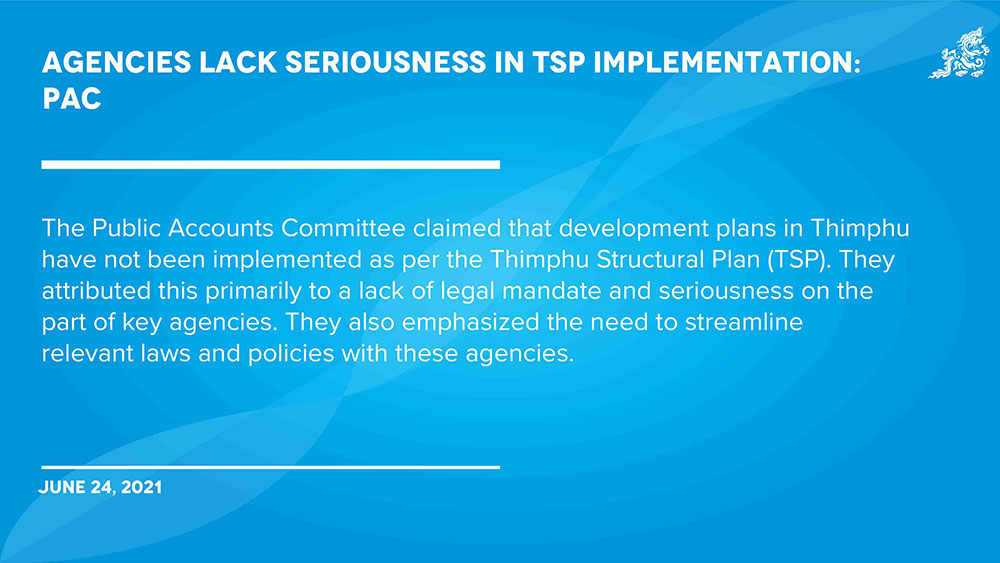Choki Wangmo
The joint sitting of the Parliament on June 22 adopted the Public Accounts Committee’s (PAC) recommendations of the performance audit report on urban planning and development in Thimphu throm.
PAC pointed out the need to streamline relevant laws and policies with different agencies to address the ambiguity surrounding Thimphu thromde’s urban planning and development.
According to the committee’s findings, although the Thimphu Structural Plan (TSP) is the primary document on thromde’s development, lack of legal mandate and lack of seriousness by principal agencies led to non-implementation of the plans as intended. “The components of the plan were either regularised or authorised by the Ministry of Works and Human Settlement (MoWHS) or Thromde tshogde on a case-by-case basis.”
This, the findings revealed, has created precedent to regularise and authorise other cases.
Lhuentse’s National Council (NC) member Tempa Dorji said that the TSP that is under the ministry’s review and expected to be complete by next year, is good in writing but the implementation has been a failure.
He said that failure is due to lack of planning and coordination among implementing agencies like the divisions in the thromde and the ministry.
He cited the example of how roads are dug up to lay electric lines, water and sewerage one after another. “Poor planning and coordination are draining the national resources.”
PAC findings also reported that there was inaction by principal agencies responsible for implementing the TSP, coupled by confusion over the institutional framework with regard to the TSP resulting in significant deviations from the actual intent of the plan.
The committee recommended the government to table the Spatial Planning Bill 2019 and the need for a holistic urban planning and development framework for Bhutan.
MoWHS Minister Dorji Tshering said the ministry submitted the Spatial Planning Bill to the Cabinet but was instructed to draft the Housing Bill, human settlement plan and residential plan. “We will be able to table the Bill in the winter session.”
Punakha’s NC member Lhaki Dolma suggested relevant agencies to look into exorbitant house rents in the capital.
She said that hiked house rents affected public servants below P5 level, which is 59 percent of the population in Thimphu. “Findings show that 40 to 98 percent of their income is paid as house rent. The policies need to change with changing situations.”
She also said that the landlords did not follow Tenancy Act, which has led to many failures in urban planning and development in Thimphu.
Lyonpo Dorji Tshering said the Housing bill would amend some of the clauses in the Tenancy Act.
The resolutions of the House is referred to the ministry and agencies, who will then report the implementation status of the resolutions in the winter session.
Edited by Tashi Dema


